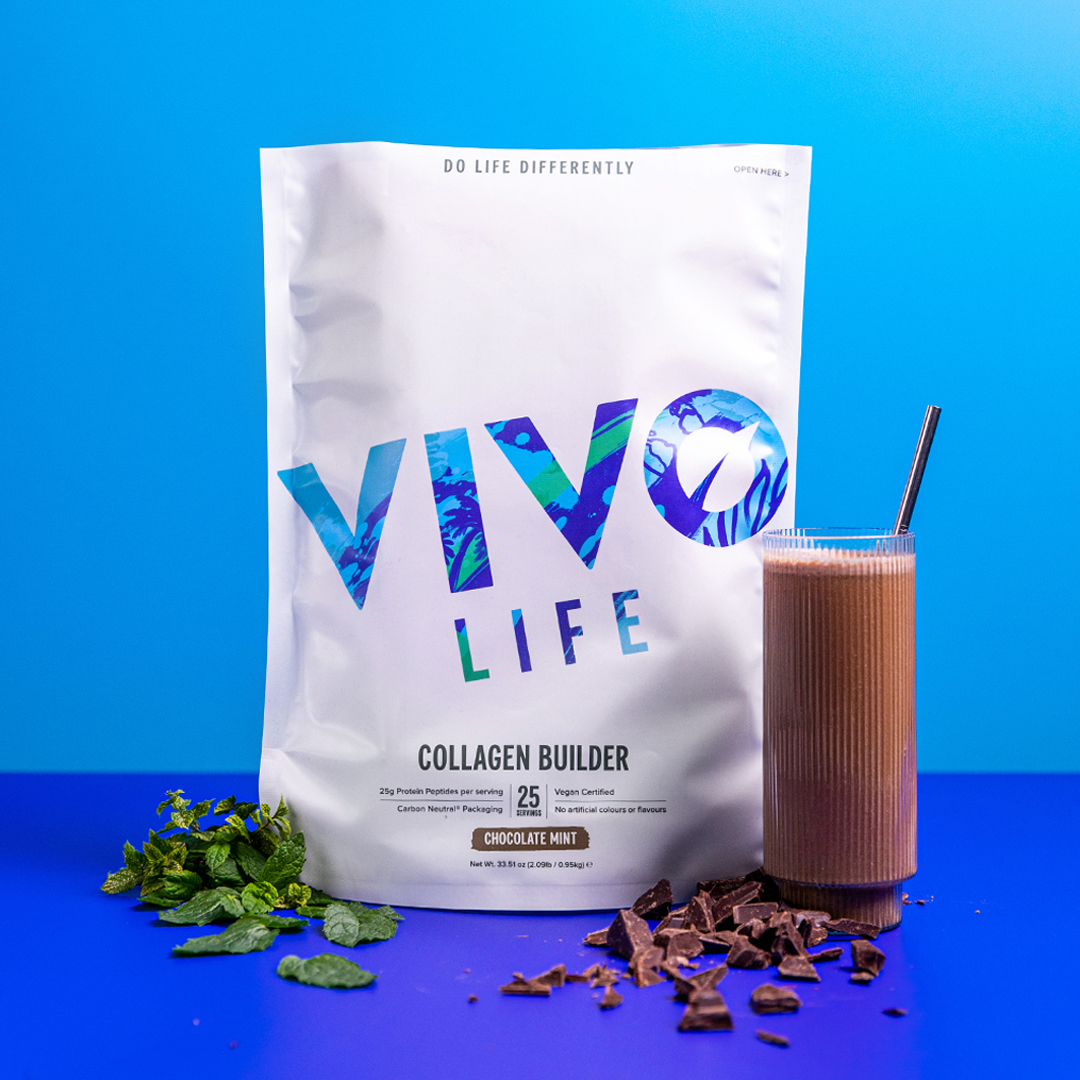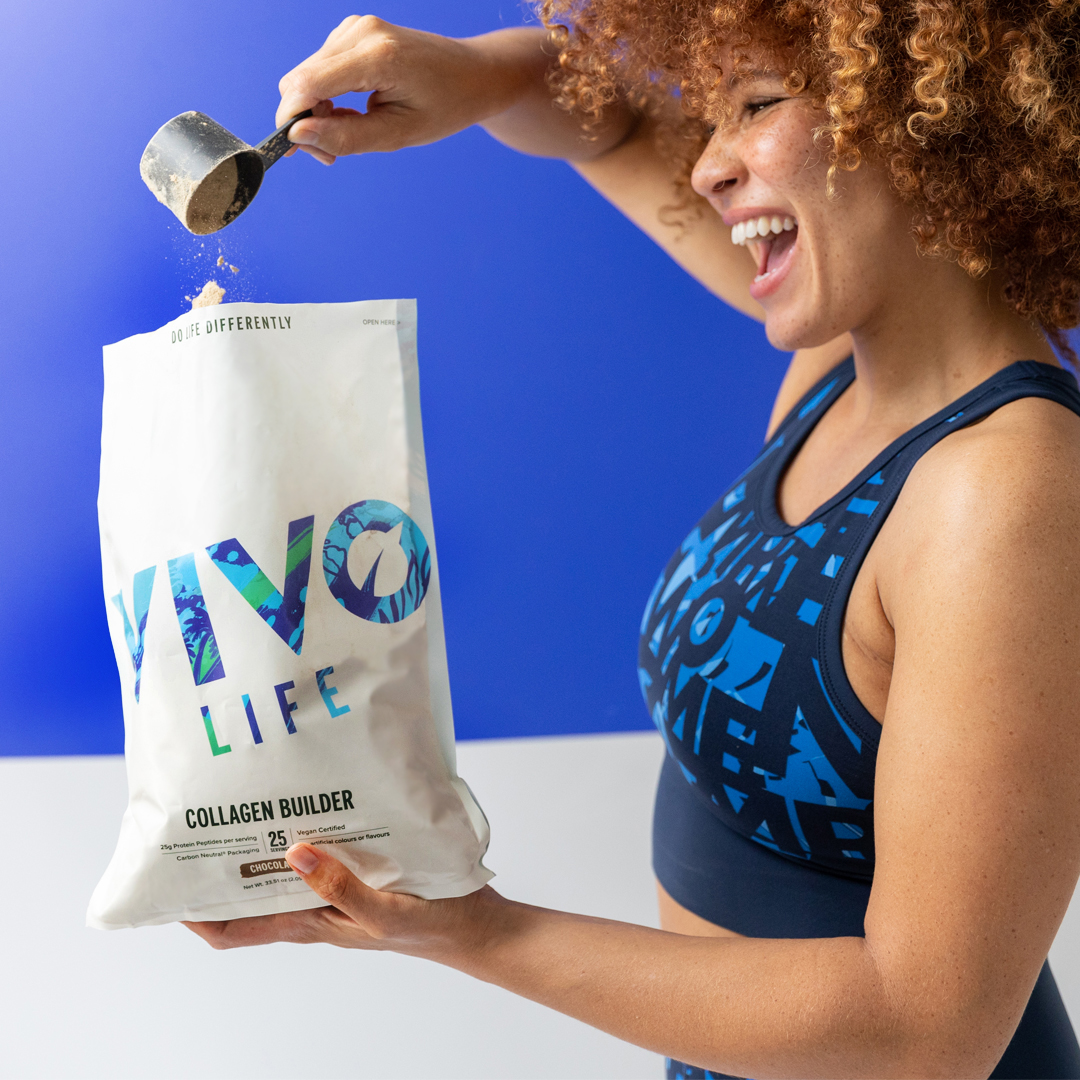COLLAGEN BUILDER
Updated
by Kat Hoyle
Collagen is the main structural protein found in our connective tissues, bones and skin; it is a tough, insoluble, fibrous protein. Our body produces its own collagen, however collagen supplementation can help to encourage this natural collagen production process which can be hugely beneficial in aiding our recovery from exercise, supporting the natural aging process, and strengthening our hair, skin and nails.

Conventional collagen supplements are derived from animal sources so are not suitable for a plant-based diet. True collagen is not found in the plant kingdom, however when we consume collagen from animal sources our bodies break this down into a series of amino acids, to then rebuild collagen proteins.
We have carefully crafted a plant-based alternative that encourages the body's natural collagen production pathways. Our Collagen Builder is a blend of the specific amino acids needed for collagen production, alongside added synergistic nutrients that encourage this natural process within our bodies. Our formula is comparable and, in fact, superior to some of the off the shelf animal-based collagens we tested, with regards to the amino acid profile.
Our Collagen Builder is the perfect option for those who want to experience the benefits of collagen supplementation without compromising the environment or animal welfare.
Collagen Builder an overview:
· 25g plant-based protein per serving.
· Additional vitamins and minerals.
· Added Turmeric.
· Hyaluronic Acid.
· 2 yummy flavors, chocolate and vanilla cinnamon!
· Smooth blend, used like a protein powder.
· Gluten and Soy free, and of course plant based!
· Specific profile of fermented amino acids to promote the body’s natural collagen production.
· Third party tested for heavy metals and other contaminants.
The amino profile of our collagen is:
Amino Acids | Amount per 36-38g serving (mg) |
Alanine | 1862 |
Arginine | 1634 |
Aspartic Acid | 2136 |
Cysteine | 155 |
Glutamic Acid | 3169 |
Glycine | 4674 |
Histidine | 464 |
Hydroxlysine | 0 |
Hydroxyproline | 2212 |
Isoleucine | 851 |
Leucine | 1543 |
Lysine | 1250 |
Methionine | 217 |
Phenylalanine | 996 |
Proline | 3055 |
Serine | 946 |
Threonine | 661 |
Tryptophan | 172 |
Tyrosine | 661 |
Valine | 961 |
What is collagen?
Collagen is a structural protein, one of the most abundant proteins in the body. Its primary function is to build structural fibers in the skin, bones, cartilage, muscles, tendons, and our extra cellular matrix (the matric that anchors cells together). Collagen ensures structural tissues say strong and supple, and able to withstand movement and stretching with resilience. Collagen is comprised of the following amino acids; proline, glycine, arginine and hydroxyproline.
At the age of 25 collagen production will start to decline over the course of a lifetime very gradually. As we age, we notice the appearance of our skin changes, perhaps our hair thins a little and nails are less strong. This is all a very normal and natural part of the aging process. We may also notice we recover slower from exercise or may be more prone to little niggles in our joints. Again, this is natural! However, research shows that we can in fact slow this rate down by ensuring our diet is rich in the minerals and amino acids that our bodies need to keep the natural collagen production process at its optimum.
How does our body make collagen?
If you are here for a geek out, stick around for this next section. If you’re not so interested in the scientific intricacies, then scroll on!
Collagen is produced naturally in our bodies and like all proteins, is made of amino acids. Collagen is made of 3 chains wound together to make a triple helix molecule. Glycine is the smallest of the 3 and enables a tightly wound configuration, this gives collagen its elastic properties enabling it to withstand stressors.
Collagen synthesis mainly occurs in specialized fibroblast cells whose main function is to synthesize collagen. There are many different variations of collagen, and synthesis processing will differ slightly from each, but generally this synthesis happens intracellularly or extracellularly.
Fibroblasts are particularly sensitive to the tension of the extra cellular matrix within which they live, and to the bio-chemical stimuli and signaling pathways that induce fibroblast activation and evoke collagen synthesis. Fibroblasts also synthesize elastin proteins and glycosaminoglycans, the combination of these and collagen help to maintain the moisturization and structural integrity of soft tissues.
Vitamin C contains hyaluronic acid and is a crucial component of collagen synthesis. It regulates the activation of lysyl and prolyl hydroxylase, two of the key enzymes in collagen bio-synthesis.
The building blocks for this process to occur are amino acids. From the age of 25-30 onwards our natural collagen production starts to drop off, so we are more reliant on food sources to provide the amino acids for this process to occur. If we eat an animal-based protein source, just like with all protein metabolism our bodies will break this down into amino acids in order to use as required by the body. When we use a Vegan Collagen Builder, we are skipping this first step by avoiding the animal source and giving the body the amino acids and synergistic nutrients for collagen synthesis directly.

How can collagen supplementation help?
Aging is a natural and wonderful process of life; we are not trying to defy time or imply that aging is negative and to be avoided. However, if we can assist our bodies in the upkeep of the natural collagen production rates in order to aid our recovery from exercise, our musculature and joint health, and maybe get a glowing complexion at the same time, then we have the options to supplement.
The natural aging process of our bodies sees a change in many things, skin appearance, a reduction in the rate of recovery from exercise and injury, bone density (particularly important for women around menopausal phase) to name a few, and collagen supplementation can help us to manage these.
Collagen and joint health
Collagen is integral to joint health because it is the main component of tendons, ligaments, and cartilage. These are the scaffolding, pulleys and cushioning that allow our joints to move effectively with ease. Collagen helps to form the meniscus which are the small C shaped structures inside joints that act as padding between bones. Ligaments and tendons are tasked with holding the joints in place by keeping strong yet flexible to allow for movement. Cartilage also acts as cushioning and padding in joints. All of these are kept working optimally by a healthy supply of collagen production, but naturally with age these decline.
Collagen and bone health
A large part of our skeletal makeup is calcium and collagen. With age and the natural decline in collagen production the structural integrity of our bones decreases, this is particularly prevalent for women around menopausal age. Adequate overall protein intake is integral to bone development and bone maintenance as we age, and as the decrease in collagen production can lead to a more fragile bone matrix, dietary collagen or supplementation with a collagen builder becomes a useful tool in supporting the longevity of our bones.
Collagen and exercise/injury recovery
Collagen plays an integral role in exercise and injury recovery, as it is one of the most abundant proteins in the body. A systematic review (a study collating and examining the results of many studies on a given subject) by Khatri et al., observed that overall collagen supplementation had a beneficial effect on joint pain, improving joint functioning, increasing the length of pain free exercise sessions, and reducing the need for recovery interventions and exercise rehabilitation. Collagen supplementation also reduced the severity of Delayed Onset Muscle Soreness after exercise.
Collagen for hair, skin and nails
Perhaps the most obvious connotation of collagen supplementation is the potential benefit to our superficial soft tissues. The presence of skin collagen has a direct relationship with dermal thickness, which is why as we age through life our skin appears thinner, as collagen provides a scaffold within the skin to provide strength, structure, and elasticity. Exogenous (from outside the body) collagen is often used by medical professionals in wound dressing, demonstrating its effectiveness for skin health. Type I collagen is the most abundant collagen found in the skin, representing around 80-90% of skin collagen. Dermal collagen is produced in the fibroblasts, a type of cell. Fibroblasts also produce a cocktail of different compounds including elastin protein and glycosaminoglycans, that together contribute to the moisture, structure, and elastic nature of the skin. Skin aging is a result of many divergent processes affecting the many aspects of the derma which in turn affects the appearance of skin. The rate of natural endogenous collagen production is thought to start to decline somewhere between the age of 25-35, depending on many extrinsic and intrinsic factors. The intrinsic factors are the internal, natural factors that are unavoidable throughout our natural lifespan, the many interacting factors that cause our natural collagen production rates to drop off with age. The extrinsic factors are the external factors that we (for the most part) do have control over, health status inclusive of diet and exercise capacity, smoking, alcohol consumption, over exposure of UV rays, radiation to name a few. All of which bear significance when it comes to supporting our bodies collagen bio-synthesis rates. These intrinsic and extrinsic factors will affect collagen production in all associated areas/systems of the body, however we most obviously notice the benefit/non-benefit in the superficial appearance of our skin, hair and nails.
Things to consider
If you are a human around the age of 25-35+, you could certainly benefit from supplementing with Collagen Builder. As with any supplement, it should be used in conjunction with healthy dietary practices and lifestyle. When we consume Collagen Builder, we are essentially giving our bodies a functional dose of amino acids. Our bodies will then metabolize those amino acids and put them to use where it needs them most, we cannot dictate to our bodies to only use these amino acids to build collagen, our bodies don’t care what it says on the pouch! To ensure that our bodies use the amino acids to build collagen stores, we should ensure all our dietary needs (particularly protein) are being met through our food primarily and topped up with other supplements if needed. Mitigating the damage of extrinsic factors that reduce our bodies collagen production is also important, factors like smoking, alcohol, radiation, excessive sun exposure, and lack of sleep should all be considered.
